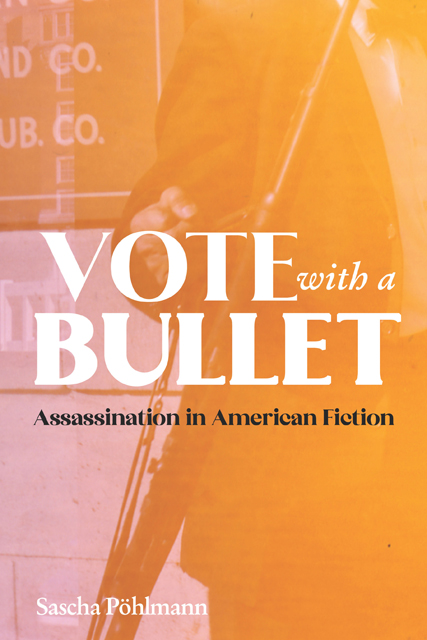Book contents
- Frontmatter
- Dedication
- Contents
- Introduction: The Individual and Society
- 1 The Princess Casamassima (1886)
- 2 The Assassination Bureau, Ltd. (1910/63)
- 3 All the King’s Men (1946)
- 4 Solar Lottery (1955)
- 5 The Manchurian Candidate (1959)
- 6 The Parallax View (1970)
- 7 Libra (1988)
- 8 The Dead Zone (1979)
- 9 11/22/63 (2011)
- 10 Big If (2002)
- 11 Checkpoint (2004)
- 12 The Good Father (2012)
- Conclusion
- Works Cited
- Index
9 - 11/22/63 (2011)
Published online by Cambridge University Press: 14 January 2023
- Frontmatter
- Dedication
- Contents
- Introduction: The Individual and Society
- 1 The Princess Casamassima (1886)
- 2 The Assassination Bureau, Ltd. (1910/63)
- 3 All the King’s Men (1946)
- 4 Solar Lottery (1955)
- 5 The Manchurian Candidate (1959)
- 6 The Parallax View (1970)
- 7 Libra (1988)
- 8 The Dead Zone (1979)
- 9 11/22/63 (2011)
- 10 Big If (2002)
- 11 Checkpoint (2004)
- 12 The Good Father (2012)
- Conclusion
- Works Cited
- Index
Summary
More than thirty years after The Dead Zone, Stephen King revisited the assassination theme in his novel 11/22/63, which harks back in many ways to the earlier novel. Its protagonist Jacob “Jake” Epping can be considered a double of John Smith, only this time the main character narrates the story as a whole, so readers are bound to his perspective even more tightly than to Johnny’s. His situation is similar in that he has to decide whether or not to intervene personally into politics outside the electoral framework, but the circumstances of his intervention are even more complex. Al, the proprietor of a diner, shows Jacob a “fissure leading into the past” to September 9, 1958, and he asks Jacob to carry out a mission he cannot accomplish since he is dying of cancer. Jacob is offered a chance to travel back in time from 2011 and change the “watershed moment” (63 57) in twentieth-century American history—the assassination of John F. Kennedy—for the better. Jacob, as Al tells him, is not acting as an assassin but seeks to prevent an assassin from carrying out his plan:
“Then I’ll go back again tomorrow and get ready to do the deed.”
“No,” he said. “You’re going to undo the deed.” (63 230)
However, Al may be overemphasizing the difference, since Jacob’s reflections about changing politics through an individual act are not unlike those of an assassin. He eventually even decides he must assassinate the assassin to change history and his own present, thinking of Oswald as his “target” (63 443). Jacob’s agency is framed in political and electoral terms in the novel, much like Johnny’s in The Dead Zone. Jacob’s initial conversations with Al, especially, show that his intervention in history is akin to changing the minds of the electorate. Defining the watershed moment in history in which a single act (such as shooting the president) has massive and unforeseeable consequences, Al adds:
“There are flash floods in history, too. Want some examples?How about 9/11? Or what about Bush beating Gore in 2000?”“You can’t compare a national election to a flash flood, Al.”
- Type
- Chapter
- Information
- Vote with a BulletAssassination in American Fiction, pp. 127 - 136Publisher: Boydell & BrewerPrint publication year: 2021

